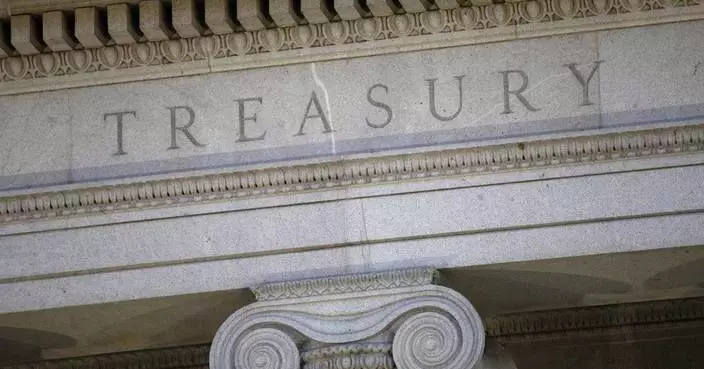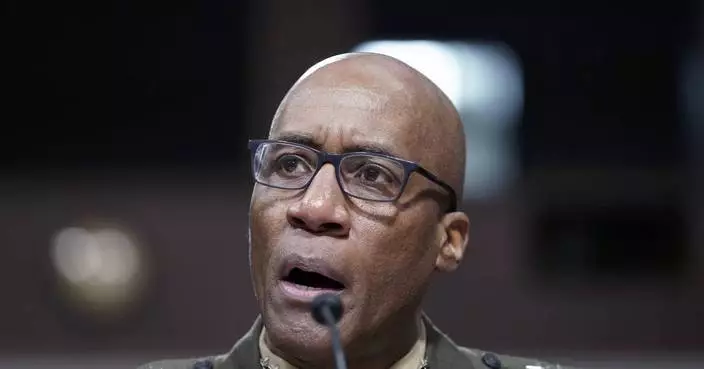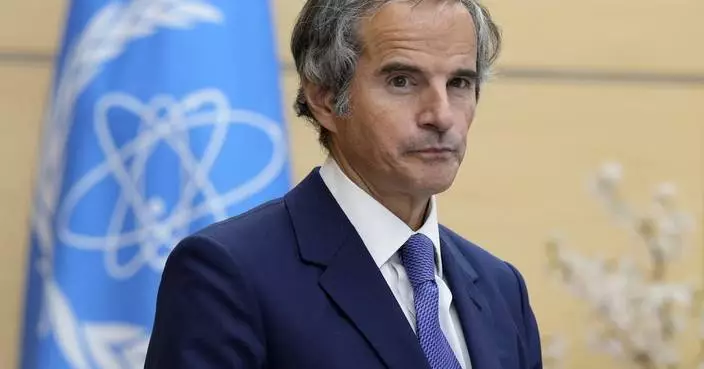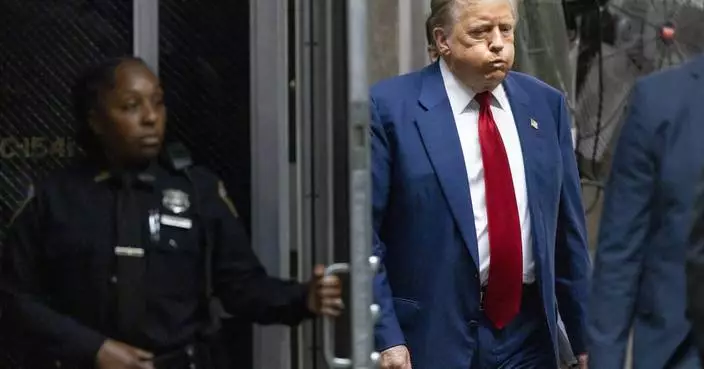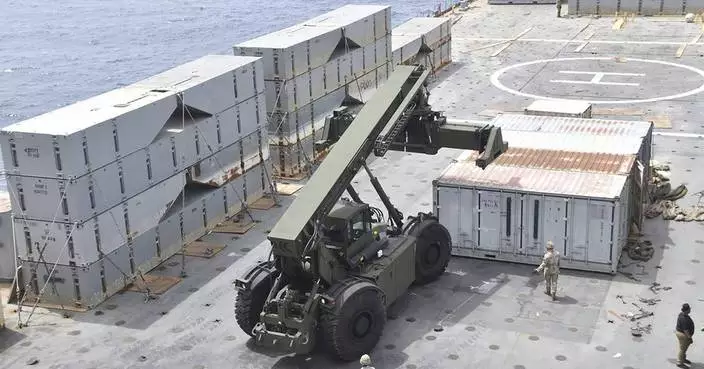Sen. Jeff Flake of Arizona, President Donald Trump's most vocal Republican adversary in the Senate, cautioned in his farewell address Thursday that the "threats to our democracy from within and without are real."
Flake declined to seek re-election to a second term, acknowledging that his battles with Trump over the past two years made it unlikely that he could survive a primary challenge. While Flake did not mention Trump in his speech Thursday, he said that describing the state of the nation's politics as "not healthy is something of an understatement."
"We of course are testing the institutions of American liberty in ways that none of us likely ever imagined we would — and in ways that we never should again," Flake said.
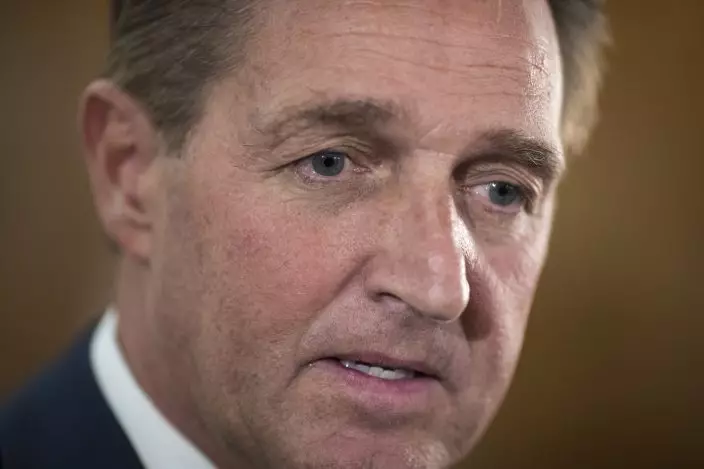
Sen. Jeff Flake, R-Ariz., a member of the Senate Foreign Relations Committee, speaks with reporters as senators are considering multiple pieces of legislation in an effort to formally rebuke Saudi Arabia for the slaying of journalist Jamal Khashoggi, on Capitol Hill in Washington, Thursday, Dec. 6, 2018. (AP PhotoJ. Scott Applewhite)
Over the past two years, Flake has made it a point to call out Trump in his writings and speeches, accusing him of "reckless, outrageous and undignified behavior" and saying that his use of the terms "fake news" and "enemy of the people" was reminiscent of words infamously used by Soviet dictator Josef Stalin.
It's unclear what role Flake could have in the Republican Party in the future. He has traveled to New Hampshire to speak to voters there and has not ruled out a run for the presidency, though he would be a huge underdog.
Flake, 55, served in the House for six terms and in the Senate for one term. He was one of the earliest and most prominent critics of spending that lawmakers diverted to their congressional districts, called earmarks. He was also an outlier among Republicans when it came to supporting an end of travel and trade restrictions with Cuba.
His push for an overhaul of the nation's immigration laws alienated many Republican voters who viewed it as rewarding people who came to the U.S. illegally. But it's his criticism of Trump that most angered the Republican base.
That was a point Trump was all-too-happy to make on Twitter after Flake made his decision to not seek re-election, also mentioning that outgoing Sen. Bob Corker, R-Tenn., was in a similar position.
"The reason Flake and Corker dropped out of the Senate race is very simple, they had zero chance of being elected. Now act so hurt & wounded!" the president tweeted at the time.
Flake also used his farewell speech to warn about global events. He said Russia's President Vladimir Putin hijacked democracy in his own country and is determined to do the same globally.
"Denial of this reality will not make it any less real," Flake said. "This is something that is staring us in the face, right now, as we are gathered here today."
Flake has been a vocal defender of special counsel Robert Mueller's probe of Russian interference in the 2016 elections. He has refused in recent weeks to vote for any of Trump's judicial nominees until he gets a floor vote on a bill to protect the special counsel.
Flake said the U.S. is a beacon to the world and that it must recognize that "the shadow of tyranny is once again enveloping parts of the globe."
"Let us recognize as authoritarianism reasserts itself in country after country that we are by no means immune," Flake said.
On Twitter follow Kevin Freking at https://twitter.com/APKFreking
UNITED NATIONS (AP) — Russia has circulated a U.N. resolution calling on all countries to take urgent action to prevent putting weapons in outer space “for all time” a week after it vetoed a U.S.-Japan resolution to stop an arms race in space.
The Russian draft resolution, obtained Wednesday by The Associated Press, goes further than the U.S.-Japan proposal, not only calling for efforts to stop weapons from being deployed in outer space but for preventing “the threat or use of force in outer space,” also “for all time.”
It says this should include deploying weapons “from space against Earth, and from Earth against objects in outer space.”
Russia’s U.N. Ambassador Vassily Nebenzia told the Security Council when he vetoed the U,S.-Japan draft that it didn’t go far enough in banning all types of weapons in space.
The vetoed resolution focused solely on weapons of mass destruction including nuclear arms, and made no mention of other weapons in space.
It would have called on all countries not to develop or deploy nuclear arms or other weapons of mass destruction in space, as banned under a 1967 international treaty that the U.S. and Russia ratified, and to agree to the need to verify compliance.
Before the U.S.-Japan resolution was put to a vote on April 24, Russia and China proposed an amendment that would call on all countries, especially those with space capabilities, “to prevent for all time the placement of weapons in outer space, and the threat of use of force in outer spaces.”
The vote was 7 countries in favor, 7 against, and one abstention and the amendment was defeated because it failed to get the minimum 9 “yes” votes in the 15-member Security Council required for adoption.
U.S. Ambassador Linda Thomas-Greenfield told the council after the vote that Russian President Vladimir Putin has said Moscow has no intention of deploying nuclear weapons in space.
“Today’s veto begs the question: Why? Why, if you are following the rules, would you not support a resolution that reaffirms them? What could you possibly be hiding,” she asked. “It’s baffling. And it’s a shame.”
Putin was responding to White House confirmation in February that Russia has obtained a “troubling” anti-satellite weapon capability, although such a weapon is not operational yet.
Russia’s U.N. Ambassador Vassily Nebenzia said after casting the veto that the U.S.-Japan resolution cherry picked weapons of mass destruction.
He said much of the U.S. and Japan’s actions become clear “if we recall that the U.S. and their allies announced some time ago plans to place weapons … in outer space.”
Nebenzia also accused the U.S. of blocking a Russian-Chinese proposal since 2008 for a treaty against putting weapons in outer space.
Thomas-Greenfield accused Russia of undermining global treaties to prevent the spread of nuclear weapons, irresponsibly invoking “dangerous nuclear rhetoric,” walking away from several of its arms control obligations, and refusing to engage “in substantive discussions around arms control or risk reduction.”
Much of the Russian draft resolution is exactly the same as the U.S.-Japan draft, including the language on preventing an arms race in space.
It calls on all countries, especially those with major space capabilities, “to contribute actively to the objective of the peaceful use of outer space and of the prevention of an arms race in outer space.”
Thomas-Greenfield said the world is just beginning to understand “the catastrophic ramifications of a nuclear explosion in space.”

FILE - U.S. Ambassador to United Nations Linda Thomas-Greenfield speaks on Thursday, April 18, 2024, in Tokyo. The U.N. Security Council is set to vote Wednesday, April 24, 2024, on a resolution announced by Thomas-Greenfield, calling on all nations to prevent a dangerous nuclear arms race in outer space. It is likely to be vetoed by Russia. (AP Photo/Eugene Hoshiko, Pool, File)





